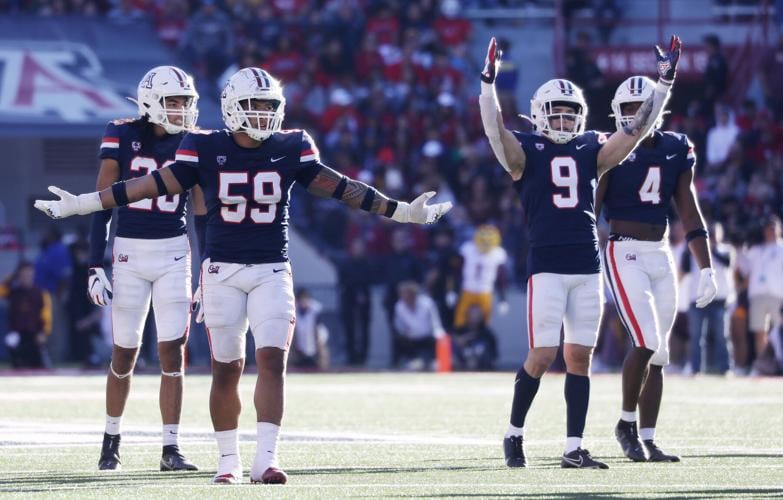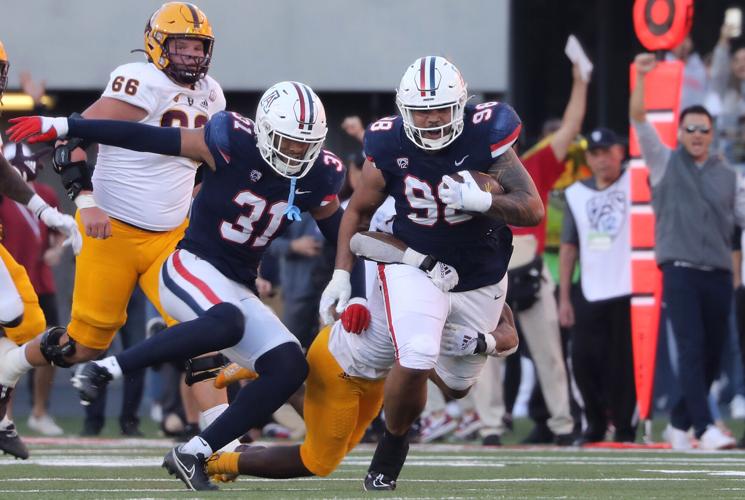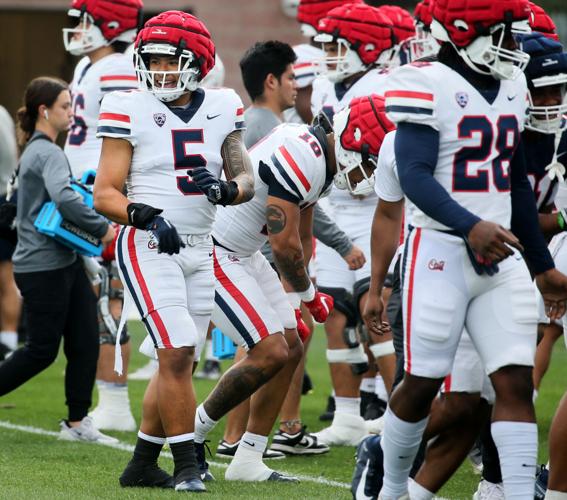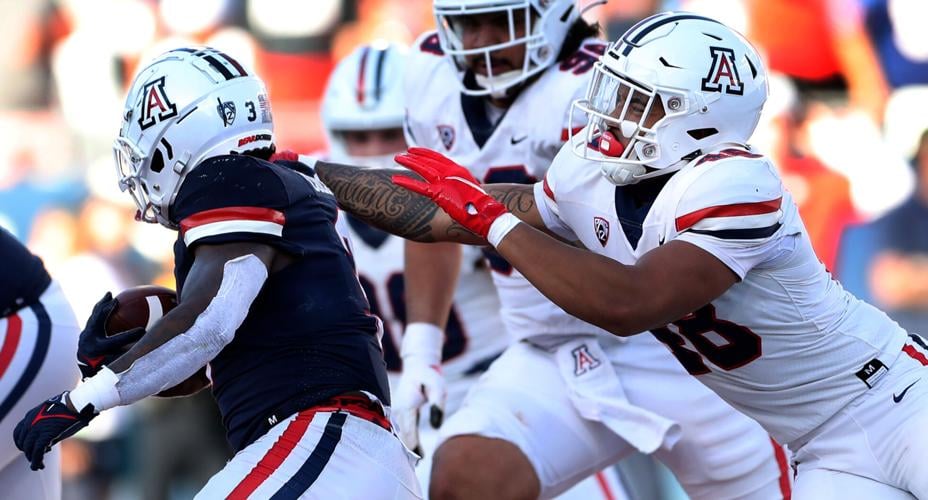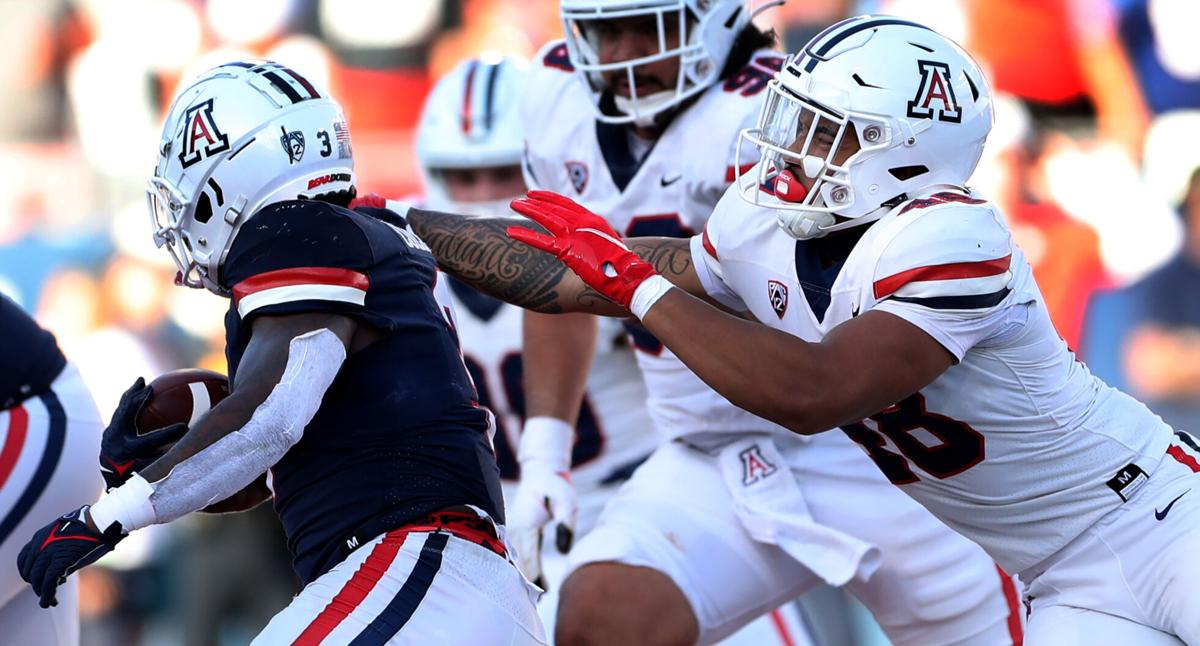It’s often been said that football success is more about a team’s Jimmys and Joes than the X’s and the O’s.
When Arizona head coach Jedd Fisch took over the Wildcats in December of 2020 and coached the UA to a 1-11 record during the 2021 season — that turned out to be the most losses by a UA team in a single season — it was evident the program’s talent level was down to the bare bones.
Counting scholarship players and walk-ons, just 21 of the 110 players (19%) on this season’s Arizona roster were a part of Fisch’s inaugural season two years ago.
Three of them are scholarship defensive players: Nickel back Treydan Stukes, safety Dalton Johnson and safety Gunnar Maldonado, who is one eight team captains for the Wildcats this year. Maldonado is the only starter from Arizona’s previous two season openers to return to the Wildcats.

Players on Arizona’s defensive unit attempt to fire up the crowd during the Wildcats’ 38-35 rivalry game win over ASU at Arizona Stadium last November.
The overhaul of players on Arizona’s roster first started on offense last season. The addition of newcomers to bolster the Wildcats’ offense to one of the best passing attacks in college football, averaging 31 points per contest.
In addition to playing underclassmen in the second half of the 2022 season to give game experience to rising young talent, Fisch and his staff used Arizona’s high-powered offense as a recruiting tool for defensive players. It’s easier to fish players out of the transfer portal when they know games at their respective program won’t be Big Ten-esque, low-scoring slugfests.
“We felt if we didn’t get good on offense, we were never going to be able to recruit defense,” Fisch said. “No one was going to want to come to a team that couldn’t score.
“For us, it was a matter of saying, ‘OK, now that the offense is in a good place, what can we do defensively?’ Fisch added. “In that case, what we did was we committed to both the portal and playing young.”
Twenty-one of the 33 scholarship newcomers Arizona signed in 2023 — that includes seven from the transfer portal — are defensive prospects; all of the transfer portal additions are front-six defenders.
The Wildcats bring back second-year defensive coordinator Johnny Nansen, who is the first returning UA defensive coordinator since the 2019 season.
“We’re going to have coach Nansen for his second year in a row, and our defense is really going to benefit from that,” Fisch said.
Nansen said, “I like where we’re at as far as defense,” even with some work to do.
“I think for these guys, being in the system for a couple of years is really helping. Am I pleased? No. There’s a lot of things we need to work on,” he said. “But one thing I like is that we’re playing with great effort.”
Here’s a position-by-position breakdown of Arizona’s defense for ’23:

Arizona’s Tiaoalii Save (98) happily lumbers up the field with a fumble recovery late in the fourth quarter to seal the win over ASU last season.
Defensive line
Projected starters: Edge rusher Isaiah Ward (6-5, 225 pounds), defensive tackle Tyler Manoa (6-5, 315 pounds), defensive tackle Bill Norton (6-6, 325 pounds) and defensive end Taylor Upshaw (6-5, 270 pounds).
Key reserves: Defensive end Ta’ita’i Uiagalelei, defensive tackle Sio Nofoagatoto’a, edge rusher Orin Patu, edge rusher Russell Davis II, edge rusher Sterling Lane II, defensive tackle Jacob Kongaika, defensive tackle Tiaoalii Savea, defensive tackle Keanu Mailoto and edge rusher Jeremy Mercier.
The rundown: Despite elevating its season takeaway total from six to 16 in a one-year span, Arizona had the eighth-worst rushing defense in FBS last season — 10th in the Pac-12. The Wildcats allowed 209.1 rushing yards per game in 2022 and had three games surrendering over 300 yards on the ground.
Between Arizona’s transfer portal additions in Upshaw (Michigan), Norton (Georgia), Manoa (UCLA), Nofoagatoto’a (Indiana) and Patu (Cal), the Wildcats added 1,485 extra pounds to its defensive front; 297 pounds per player.
“We’re big up front, man,” Nansen said. “We’re big and guys can get to the quarterback.”
Ward, a 6-5, 225-pound redshirt freshman, is emerging as a potential starter at “Kat,” a position previously held by Hunter Echols. The athletic but underweighted Ward has been among the top edge rushers for Arizona in preseason training camp.
“Every day, he’s getting better,” Nansen said of Ward. “The challenge is how can you maintain the weight when you’re playing big-time ball with the offensive tackles that are big.
That’s going to be challenging for him, but his speed and quickness is going to help him.”
Now, with an abundance of defensive linemen, Nansen said Arizona will likely use “eight to nine guys” in rotation every game.
“We’re subbing. Like I told the guys, ‘If we’re playing more than four snaps, then we’re not doing our jobs as coaches, especially up front.’ ... But up front we got to rotate,” Nansen said. “It’s a long game, especially now in college football, you average anywhere from 85-90 plays and you have to keep those guys fresh.”
Will it be enough for Arizona to stop the run?
“We’ll see,” said Nansen. “That’s what we’ve been stressing all camp.”
Nansen said stopping the run, not giving up “explosive plays” and causing turnovers are “the three things we talk about.
“If we could just focus on those three things, we’ll be pleased by the end of the season.”

Jacob Manu (5) is all smiles as players line up during spring practice in March.
Linebackers
Projected starters: Jacob Manu (5-11, 225 pounds), Justin Flowe (6-2, 225 pounds)
Key reserves: Daniel Heimuli, Kamuela Ka’aihue, Leviticus Su’a, Taye Brown.
The rundown: A key playmaker for the Wildcats in the second half of the season, Manu had two essential plays in the Wildcats’ win over Arizona State in the Territorial Cup finale. Among them: knocking ASU quarterback Trenton Bourguet’s arm to turn the pass into a game-sealing interception.
Nansen said, “Manu is growing into his own as a leader” this season.
Manu, another team captain this season, is projected to start at “Will” linebacker, however, “Mike” linebacker is “neck and neck” between Flowe, an Oregon transfer and former five-star high school All-American and top-rated inside linebacker, and the ex-Washington Husky in Heimuli. Both Flowe and Heimuli split reps in training camp.
“You go and recruit players and let them battle it out,” Nansen said. “That’s the whole deal. Bring them in here and see who’s going to be the best guy.”

Cornerback Ephesians Prysock stretches out with the defensive unit as the Wildcats get ready for the University of Arizona’s spring practice session in March.
Defensive backs
Projected starters: Cornerback Ephesians Prysock (6-4, 190 pounds), strong safety Gunner Maldonado (6-0, 195 pounds), free safety Genesis Smith (6-2, 200 pounds), nickel back Treydan Stukes (6-2, 195 pounds), cornerback Dylan Wyatt (6-1, 190 pounds).
Key reserves: Safety Isaiah Taylor, nickelback Martell Irby, cornerback Tacario Davis, safety Dalton Johnson, cornerback Jai-Ayviauynn Celestine, safety DJ Warnell, cornerback Charles Yates Jr.
The rundown: The “wide-open” competition for Arizona’s free safety and strong safety spots remains ongoing but will come down to a tandem of either Maldonado, Smith, Johnson or Taylor.
Nansen said Smith, a former Chandler Hamilton High School star, is “coming along” as a true freshman.
“Every day, he’s getting better,” Nansen said. “There’s a lot to learn, and Coach (Duane) Akina has been really hard on him, and we’re really counting on him to come in and really help us. ... He’s rangy, he’s really smart, his football IQ is unbelievable, so we’re counting on him to play for us.”
Smith’s age won’t deter his playing time this season, said Nansen.
“The best guys will play in this program. Don’t matter to me,” Nansen said. “Like I told the guys, if the freshman is the best player, we’re going to play him. Simple as that. Competition brings the best out of people.”
Although the Wildcats allowed an average of 36.5 points per contest in 2022, which was second-worst in the Pac-12, safeties coach Chuck Cecil said a successful season for the UA’s defense will reflect on the team record.
“If it’s 40-39 and the other team has 39 and we got 40, that’s good defense,” Cecil said. “Good defense is holding the opponent to less points than the offense. It’s a team game. I don’t care if they score 60, if we score 61, we won the game. If we we score 3 and they score 2, we won the game.
“At the end of the day, it’s the W. That’s what’s important.”


